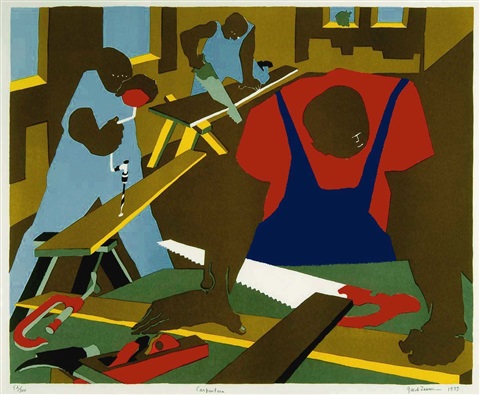Labor Day
Langston Hughes understood the working class as well as any poet I know. Here’s a Labor Day poem to honor those who pick up after us.
Brass Spittoons
Clean the spittoons, boy.
Detroit,
Chicago,
Atlantic City,
Palm Beach.
Clean the spittoons.
The steam in hotel kitchens,
And the smoke in hotel lobbies,
And the slime in hotel spittoons:
Part of my life.
Hey, boy!
A nickel,
A dime,
A dollar,
Two dollars a day.
Hey, boy!
A nickel,
A dime,
A dollar,
Two dollars
Buy shoes for the baby.
House rent to pay.
Gin on Saturday,
Church on Sunday.
My God!
Babies and gin and church
And women and Sunday
All mixed with dimes and
Dollars and clean spittoons
And house rent to pay.
Hey, boy!
A bright bowl of brass is beautiful to the Lord.
Bright polished brass like the cymbals
Of King David’s dancers,
Like the wine cups of Solomon.
Hey, boy!
A clean spittoon on the altar of the Lord.
A clean bright spittoon all newly polished—
At least I can offer that.
Com’mere, boy!
Hughes gets the importance of finding dignity in one’s work. There may be few more undesirable jobs than cleaning spittoons (or today, urinals), but this janitor, addressed by the condescending appellation “boy,” finds a way to ennoble his work: he puts himself in the company of Biblical patriarchs.
The speaker isn’t a saint or a sinner but a real person: he attends church on Sunday and he visits gin shops with his “baby” on Saturday night. The money he makes goes sometimes to rent, sometimes to the collection plate, sometimes to his women. Trying to find coherence to his feelings that are as mixed as the coins he receives and the ways that he spends them, he taps into Biblical images of partying. These aren’t just spittoons but brass spittoons, just like the brass cymbals that David’s dancers danced to or the brass goblets mentioned in Song of Solomon. He may be drawing on the following passages:
Then David spoke to the chiefs of the Levites to appoint their relatives the singers, with instruments of music, harps, lyres, loud-sounding cymbals, to raise sounds of joy. (Chronicles 15:16)
Your navel is a rounded goblet that never lacks blended wine. Your waist is a mound of wheat encircled by lilies. (Song of Solomon 7:2)
Or even:
Give strong drink unto him that is ready to perish, and wine unto those that be of heavy hearts. (Proverbs 31:6)
Whatever the passage, he has talked himself into a better frame of mind by the end of the poem.
Hughes leaves us, however, with an unsettling question: Can this new vision of himself withstand his next degrading order, which is only as far away as his next customer? The last line is a stinging indictment of racism, conveyed through the understated ironic juxtaposition that is Hughes’s trademark.


